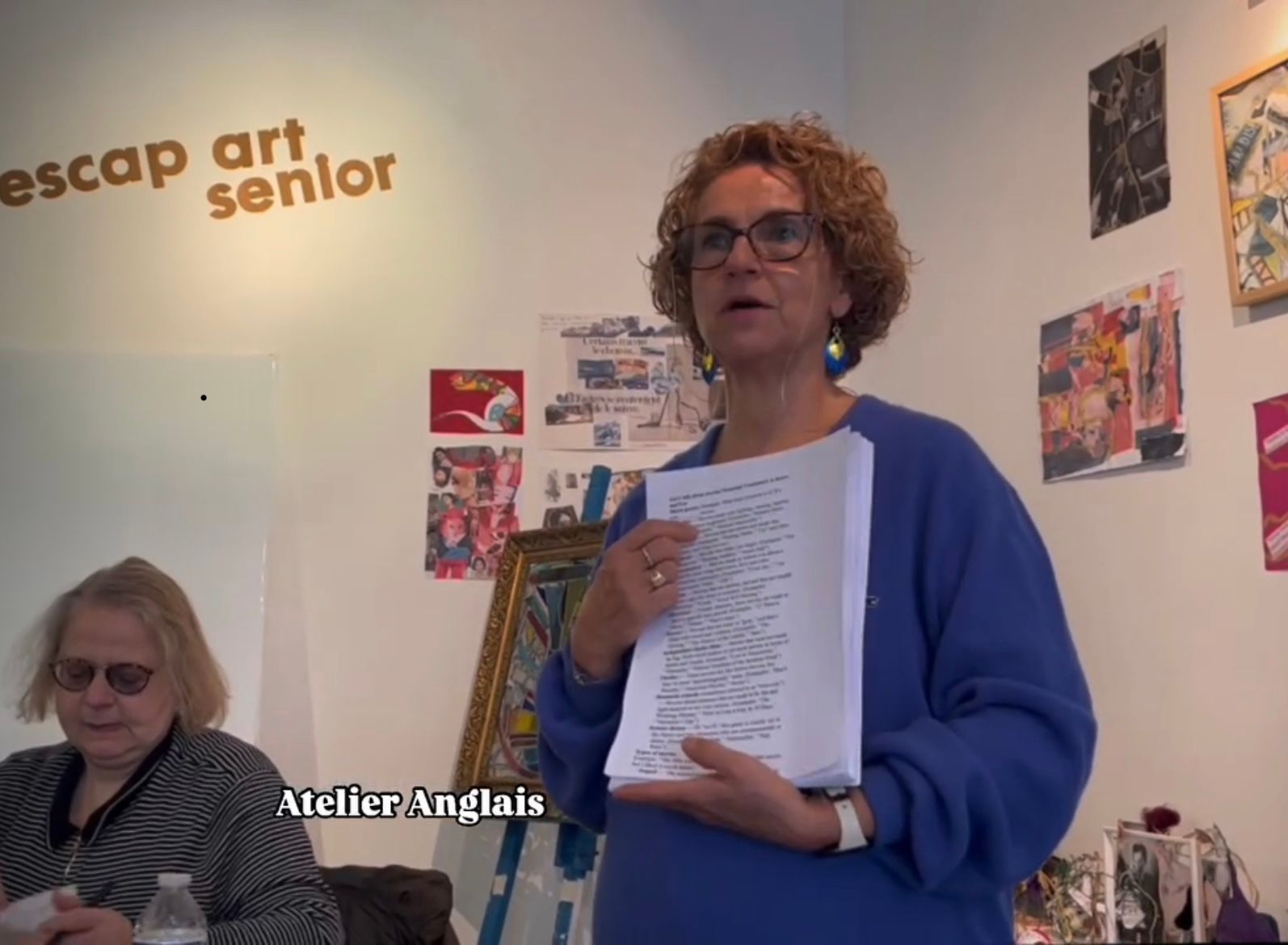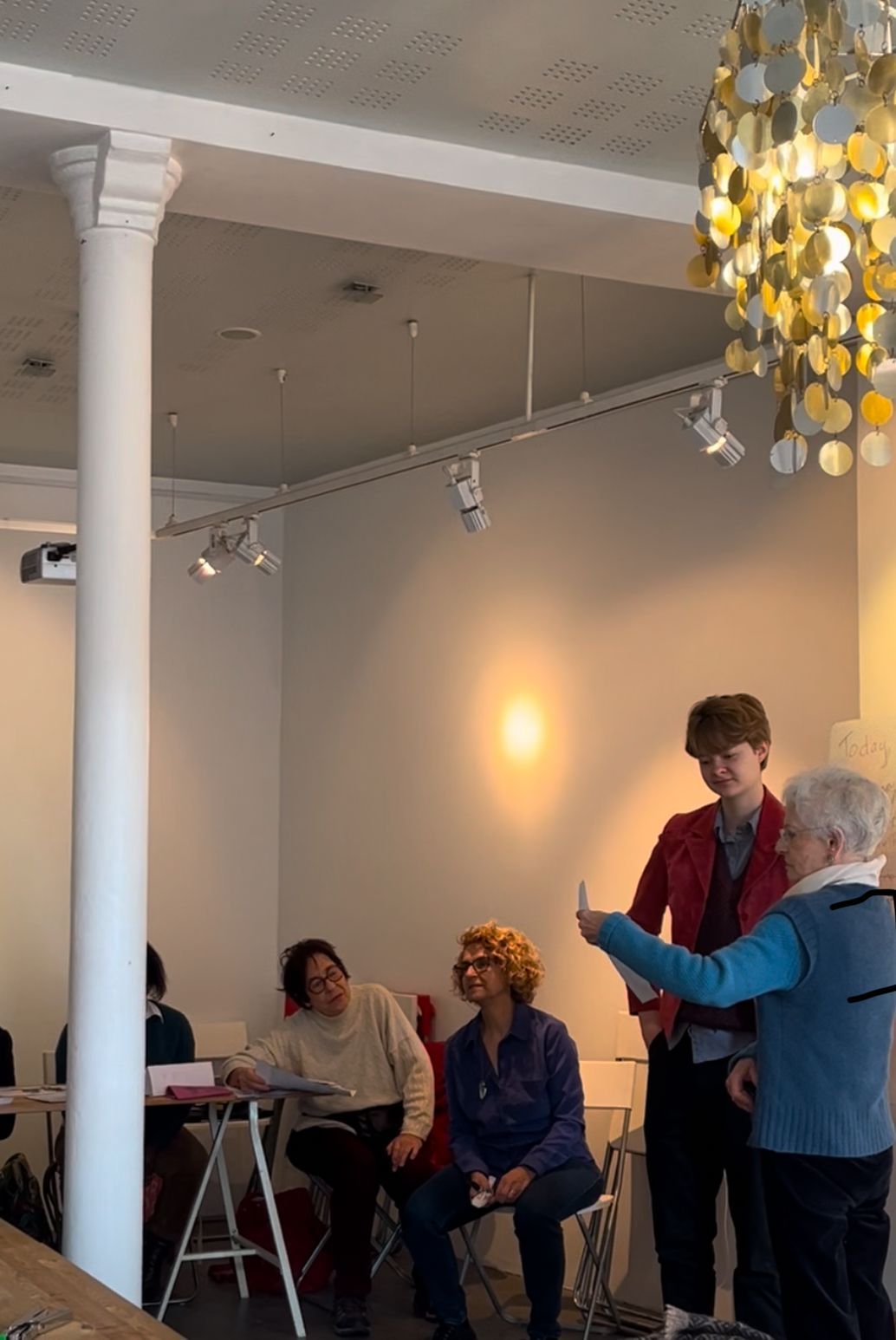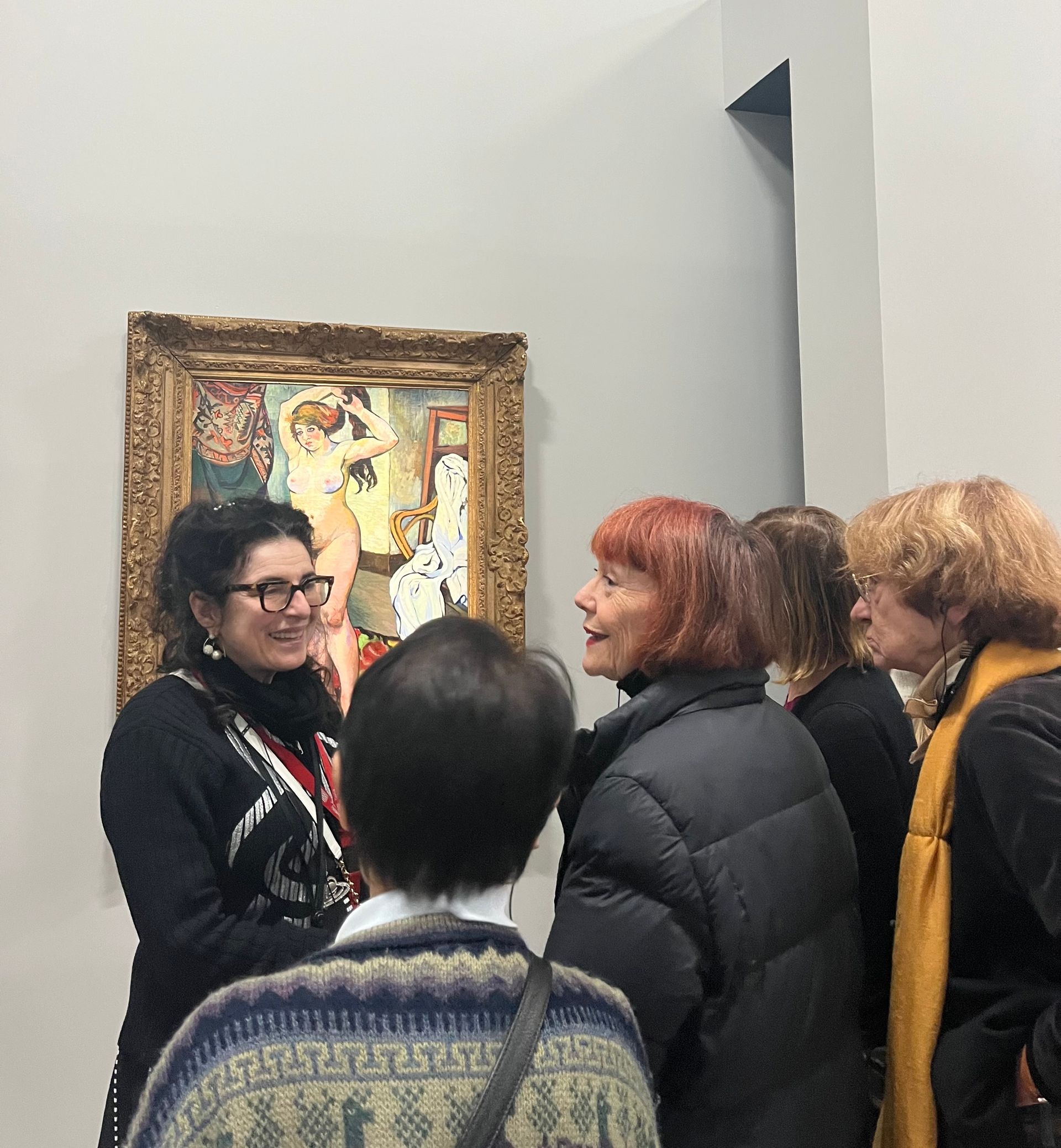Ateliers de Conversation en Anglais avec Lisa Fleury
Ateliers de Conversation en Anglais avec Lisa Fleury
Lisa Fleury, bénévole passionnée, anime les ateliers de conversation en anglais à l’Espace Canopy. Dans cet entretien, elle nous partage son parcours au sein de l’association et les motivations qui l'ont poussée à offrir son temps et ses compétences pour animer ces ateliers destinés à nos seniors.
Voici un entretien que nous avons eu avec Lisa, où elle nous raconte en détail son expérience et son travail avec les participants de ses ateliers.
~~~
Qu’est-ce qui vous a poussé à faire du bénévolat à Espace Canopy et à enseigner l’anglais aux seniors ?
Après avoir participé à de nombreuses sorties et visites d'expositions avec Escap'Art, j'ai reçu un courriel d'Espace Canopy me demandant si des anglophones souhaitaient organiser un atelier de conversation en anglais, parce qu’ il y avait de la demande. Les gens que j'avais rencontrés à l'Espace Canopy étaient si ouverts et gentils, et j'étais très reconnaissant pour les généreuses opportunités d'Escap'Art, j'ai donc décidé de me porter volontaire pour organiser une séance d'anglais. Je voulais aussi mieux connaître des Français. Notre première séance d'atelier de conversation en anglais était tellement amusante et les participants tellement enthousiastes que j'ai eu envie de continuer ! Je reçois tellement de satisfaction d’être avec ce groupe.
Comment avez-vous débuté votre implication dans cette association ?
J'ai lu une annonce de visite avec Escap'Art dans la newsletter d'une autre association partenaire, AAWE. Je venais de prendre ma retraite et j'avais le temps et l'énergie de visiter tous les musées que je n'avais pas pu visiter auparavant.
Comment parvenez-vous à rendre les leçons éducatives tout en les gardant amusantes et engageantes pour les seniors ?
Tout d’abord, tous les participants savent qu’ils peuvent s’exprimer librement lors de l’atelier de conversation anglaise, sans jugement ni critique. Nous accueillons toute personne possédant une connaissance de base de l'anglais et souhaitant participer au groupe. Je recrute également des anglophones, des amis, des collègues et des étudiants pour participer à l'atelier afin que les participants non natifs puissent pratiquer leur anglais avec un anglophone natif en petit groupe. Nous sommes tous ici pour nous amuser ensemble dans un environnement informel et inclusif.
Chaque session a un thème, généralement autour de la culture au sens très large ou un sujet pratique qui a été proposé par les participants. Je fournis du vocabulaire et des outils de base pour la conversation, et nous nous répartissons en groupes ou en paires pour une conversation, un jeu ou une création ludique. Ensuite, nous avons un « show and tell » où chaque groupe présente sa discussion. À la fin de la plupart des séances, nous nous réunissons pour chanter une chanson en anglais.
Avez-vous remarqué des changements positifs dans la confiance des seniors dans leurs capacités grâce à l’apprentissage de l’anglais ?
De nombreuses personnes âgées ont appris l'anglais à l'école où elles ont été notées et évaluées. Elles ont une bonne connaissance de base de l'anglais. L'atelier de conversation anglaise permet à chacun de s’exprimer en anglais dans un espace bienveillant et d'améliorer son vocabulaire et son expression petit à petit sans pression ni stress. J'ai vu les participants apprendre à mieux se connaître et se sentir plus à l'aise pour parler d'eux-mêmes ; leur vie, leurs opinions et leurs préférences. Je pense qu'ils sont tous très courageux et parlent de plus en plus avec aisance.
Comment adaptez-vous vos cours pour répondre aux besoins des seniors qui peuvent avoir des niveaux ou des capacités d'apprentissage différents ?
Il y aura toujours une variété de capacités, de connaissances et de talents dans un groupe. Ce sont de merveilleuses ressources qui enrichissent nos conversations. J'essaie donc de façonner les sessions de manière à ce que le talent et les capacités uniques de chacun contribuent d'une manière ou d'une autre à rendre la session intéressante, utile et amusante pour tout le monde. Mon objectif est que chacun ait l'opportunité de parler et de partager avec le groupe, et qu'il repart de l’atelier avec le sentiment d'avoir appris un nouveau mot ou une nouvelle phrase, chanté une chanson et établi un lien positif avec les autres participants.
~~~
Ces ateliers de conversation en anglais ont donné des outils aux participants améliorant leurs connaissances. De nombreuses études ont montré que l’apprentissage du vocabulaire et des règles de grammaire renforce la mémoire en obligeant le cerveau à retenir et à rappeler régulièrement des informations. Pour les personnes âgées, cela peut se traduire par une amélioration de la mémoire à court et à long terme et par de meilleures compétences en résolution de problèmes.
Ils ont aussi permis aux participants de bénéficier de nouvelles expériences et sorties culturelles afin de renforcer et approfondir ce qu’ils ont appris. Tel des visites guidées en anglais au Centre Pompidou pour voir l'exposition consacrée à Suzanne Valadon, et leur autre exposition sur le Surréalisme. Les ateliers de Lisa sont une source de développement personnel pour les participants réguliers. Elle encourage fortement la venue de nouvelles personnes à découvrir la langue anglaise sous multiples facettes dans un cadre détendu et encourageant.
Ces ateliers incluent également la participation d'étudiants dont la langue maternelle est l’anglais, qui sont en échange en France. Cela offre aux participants l'occasion de mener des conversations fluides et d'apprendre de nouveaux mots du quotidien, plutôt que dans un registre formel ou écrit. Lisa est toujours à la recherche de personnes parlant couramment anglais, prêtes à participer et à aider les participants à améliorer leur anglais. On encourage la venue de plus d’accents, afin de les donner a bit more of a challenge!
~~~
Lisa Fleury, a passionate volunteer, leads English conversation workshops at Espace Canopy. In this interview, she shares with us her journey within the association and the motivations that pushed her to offer her time and skills to lead these workshops for our seniors.
Here is an interview we had with Lisa, where she tells us in detail about her experience and her work with the participants of her workshops.
~~~
What inspired you to start volunteering at Espace Canopy and teach English to seniors?
After several months visiting exhibits with Escap'Art, I received an email from Espace Canopy asking if any anglophones would like to hold an English conversation workshop since there was a demand for it. The people I had met at Espace Canopy were so open and kind, and I was very grateful for the generous Escap'Art opportunities, so I decided to volunteer to hold one English session. I also wanted to get to know a group of French people better. Our first English conversation workshop session was so fun and the participants so enthusiastic that I wanted to continue! I get so much satisfaction out of being with this group.
How did you first get involved with this association?
I read an announcement for a visit with Escap'Art in the newsletter of another partner association, AAWE. I had just retired and had the time and energy to visit all the museums I hadn't been able to while working.
How do you balance making the lessons educational while keeping them fun and engaging for the seniors?
First off, all the participants know that they can express themselves freely in the English Conversation Workshop without judgment or criticism. We welcome anyone who has a basic knowledge of English and is willing to participate in the group. I also recrute native English speakers, friends, colleagues, and students to join in the workshop so the non native speakers can practice their English with a native English speaker. We are all here to have fun together in an informal and inclusive environment.
Each session has a theme, usually around culture in a very broad sense or a practical topic that has been suggested by the participants. I provide some basic vocabulary and tools for conversation, and we break out into groups or pairs for conversation, or a game, or a creation of some sort. Then we have a "show and tell" where each group presents their discussion. At the end of most sessions we join together to sing a song in English.
Have you noticed any positive changes in the seniors’ confidence in their abilities as a result of learning English?
Many seniors learned English in school where they were graded and evaluated. They have a good basic knowledge of English. The English Conversation Workshop allows everyone to practice their spoken English in a non-threatening space and improve their vocabulary and expression little by little without pressure or stress. I have seen the participants get to know each other better and feel more comfortable speaking to each other about themselves; their lives, opinions, and preferences. I think they are all very brave and speak with more and more ease.
How do you tailor your lessons to meet the needs of seniors who might have different learning speeds or abilities?
There will always be a variety of abilities, knowledge, and talent in a group. These are wonderful resources that enrich our conversations. So I try to fashion the sessions so that everyone's unique talent and ability will contribute in some way to making the session interesting, useful, and fun for everyone. My goal is that everyone has the opportunity to speak and share with the group, and leaves class feeling they have learned a new word or phrase, sung a song, and connected to the other participants in a positive way.
~~~
These English conversation workshops gave participants tools to improve their knowledge. Many studies have shown that learning vocabulary and grammar rules strengthens memory by forcing the brain to retain and recall information regularly. For older adults, this can result in improved short- and long-term memory and better problem-solving skills.
They also allowed participants to benefit from new experiences and cultural outings in order to reinforce and deepen what they have learned. Such as guided tours in English at the Center Pompidou to see the exhibition dedicated to Suzanne Valadon, and their other exhibition on Surrealism. Lisa's workshops are a source of personal development for regular participants. It strongly encourages new people to discover the English language in its many facets in a relaxed and encouraging environment.
These workshops also include the participation of students whose mother tongue is English, who are on exchange in France. This provides participants with the opportunity to have free-flowing conversations and learn new everyday words, rather than in a formal or written register. Lisa is always looking for fluent English speakers who are willing to participate and help participants improve their English. We encourage the arrival of more accents, in order to give them a bit more of a challenge!
Autres articles...








